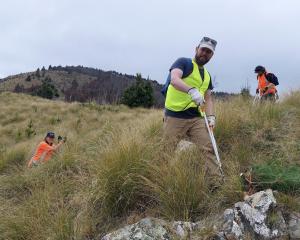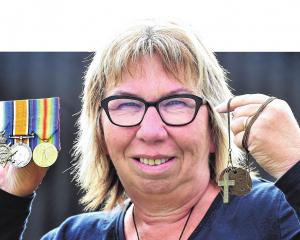Mr Mellish came to Balclutha this week to speak about ''neighbours looking after neighbours'' to a cross-section of about 45 rural professionals at the South Otago Town and Country Club.
The talk was prompted by the stress farming communities would face due to the low dairy payout, and the impact that could have on mental health in the farming community, he said.
''The sooner we can get help in there, the better.''
The trust, which connects farmers to experts and agencies in times of extreme weather events or other difficult times, offers confidentiality both to those who make referrals and to those who receive assistance.
Mr Mellish noted a series of key stressors and asked people to watch for tell-tale signs of stressed-out farmers, which included a lack of motivation to ensure animal health. He emphasised the importance of a healthy work-life balance for farmers.
He said the ''I'm all right, mate'' mentality and the stigma around mental health were hurting farmers.
And he said the consequences for farmers were serious: in New Zealand, a farmer committed suicide every two weeks. Of New Zealand's about 500 suicides a year, 26 a year on average were farmers. This year, the number was trending higher.
The statistics, Mr Mellish said, were ''horrific''. Sharemilkers on a contract, who would take a percentage of the income on the farm, were in an especially difficult financial situation now, he said.
Despite all this, Mr Mellish told his audience it was important to remain positive - and it was important for farmers and those who work with farmers to know help was available.
DairyNZ consulting officer for South and West Otago Guy Michaels said he was seeing signs of stress in some farmers and was pleased to see the turnout of accountants, bankers, and retailers in South Otago.
''It's good knowing that everyone else is thinking the same thing.
''Talk to your neighbours, talk to your friends, look out for one another.''
Shand Thomson Chartered Accountants principal Jim Johnstone, said he had many clients in agri-business. The situation for farmers was ''very serious'' and would continue to be so for the next 18 months.
''A lot of businesses will responsibly work out a holding position, if you like, but there will be 10-15% that will be really at risk.''
He shared Mr Mellish's concerns for sharemilkers' finances.
''You've got the contract milkers right now that have got very little capital tied up in their business. They've borrowed money to buy cows, or they've got very little security - they're very much at risk.''
The landowners with good equity positions too, though, could face ''quite a substantial cash loss''.
''There's no real one fix for all,'' he said.
''Every business has to be looked at and their own solution found. That's where you need to work with the professionals working in those areas to find what they need to do, but they need to be doing those things now.''












